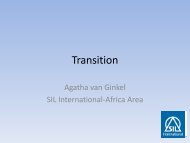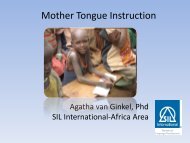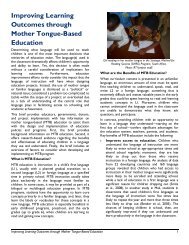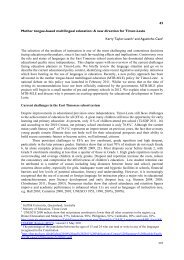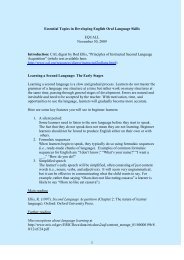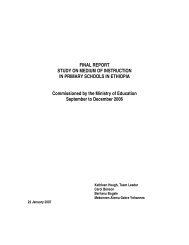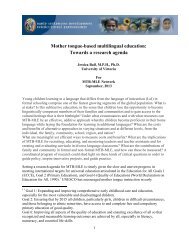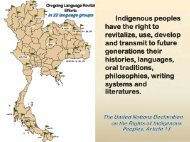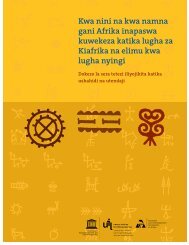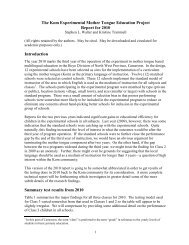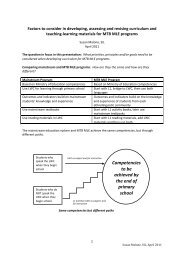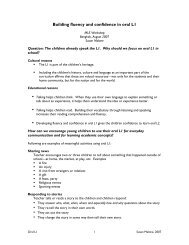Part I.pdf - MTB-MLE Network
Part I.pdf - MTB-MLE Network
Part I.pdf - MTB-MLE Network
You also want an ePaper? Increase the reach of your titles
YUMPU automatically turns print PDFs into web optimized ePapers that Google loves.
CHAPTER 2Project Overview and Country SummaryReportsOverview of the UNESCO-APPEAL “Mother Tongue/BilingualLiteracy Programme for Ethnic Minorities” projectUnder the project “Mother Tongue/Bilingual Literacy Programme for Ethnic Minorities,” UNESCOBangkok is currently supporting five countries (Bangladesh, China, India, the Philippines andThailand) to undertake baseline research, identify participating ethnolinguistic communities andprepare literacy materials using mother tongue/bilingual approaches.The general objectives of this project are:• to increase literacy rates among ethnic minority communities (contributing to theachievement of EFA Goal 4 1 ) through the provision of opportunities to access basiceducation (EFA Goal 2 2 ), and;• to improve the quality of life and preserve traditional culture through the provision ofrelevant and comprehensive literacy programmes.Community baseline studies have been conducted in each country in order to identify ethnolinguisticminorities among whom pilot projects can take place, determine the situation of the local population,its learning needs and the languages spoken and written by members of target communities.<strong>Part</strong>icipating groups develop an appropriate writing system if there is no current appropriateorthography for the target communities. Based on the identified needs, the project team preparesand field tests mother tongue/bilingual learning materials in cooperation with community members,professional linguists and education specialists. Teachers and facilitators receive training in theskills needed to use these materials in a multilingual context with ethnic minority peoples. Thesematerials are used in literacy classes within target communities. Ongoing evaluation of the curriculumdevelopment and materials production process is crucial to the programme review process.The project emphasizes the importance of capacity-building, community empowerment, povertyalleviation and programme sustainability. The partner organizations responsible for these pilotprojects, together with language community members – community leaders, facilitators and other1EFA Goal 4: Achieve a 50% improvement in levels of adult literacy by 2015, especially for women and equitable access tobasic and continuing education for all adults.2EFA Goal 2: Ensuring that by 2015, all children – with special emphasis on girls and children in difficult circumstances –have access to completely free and compulsory primary education of good quality.9



